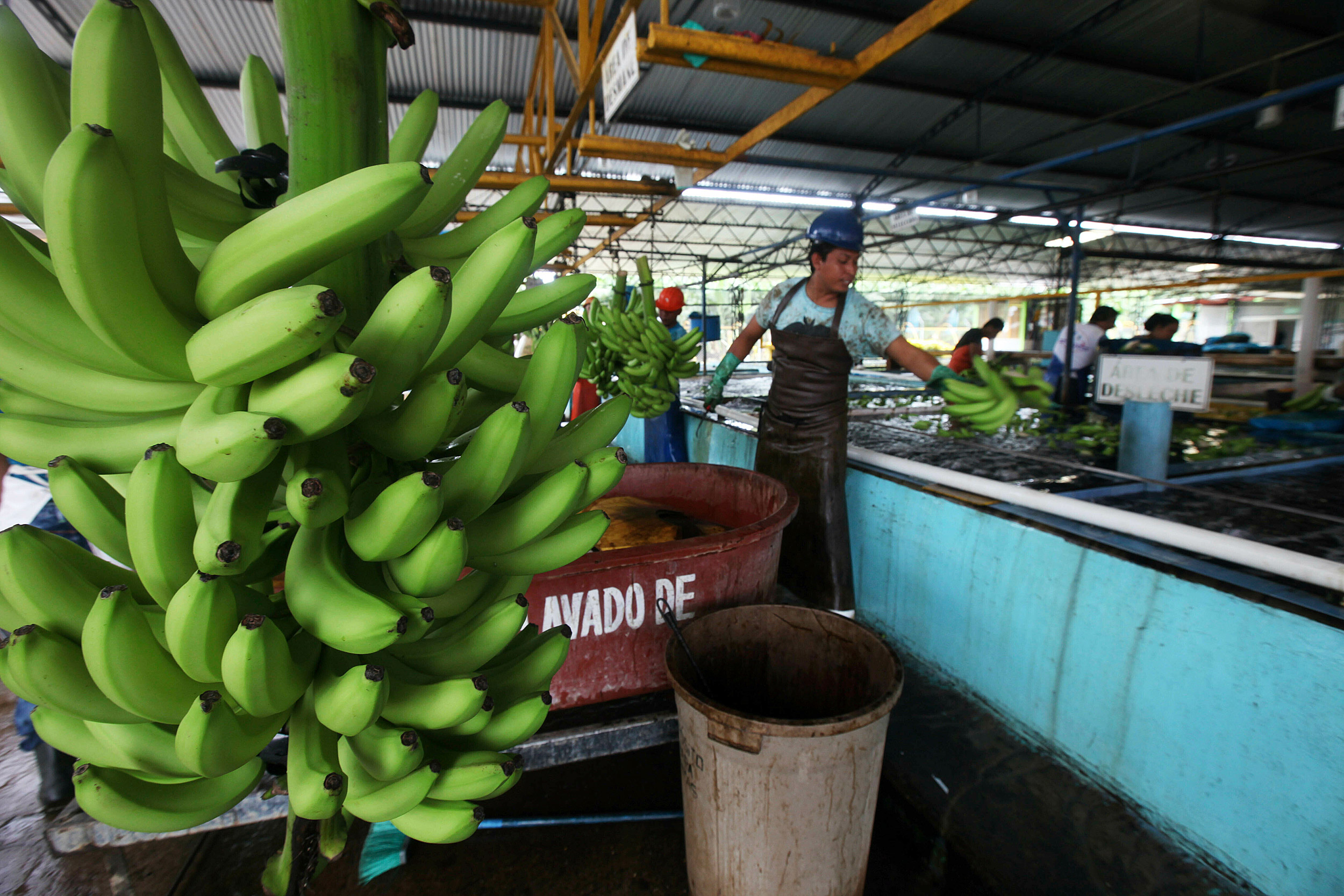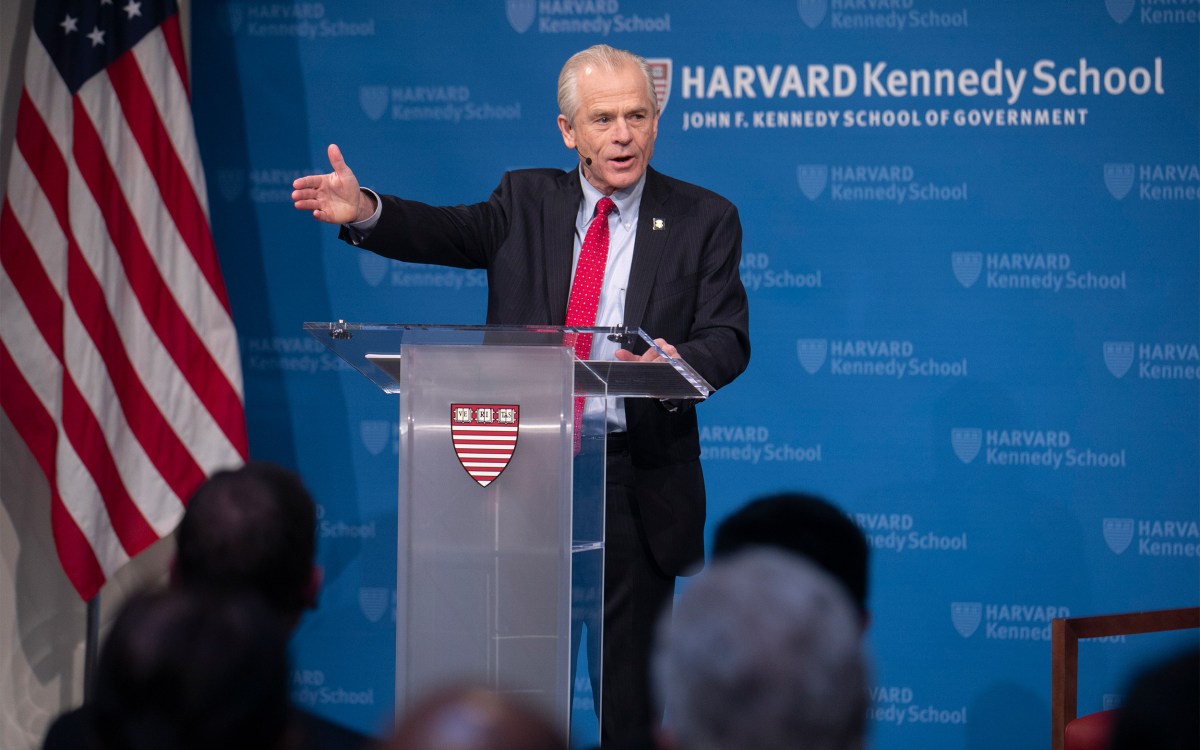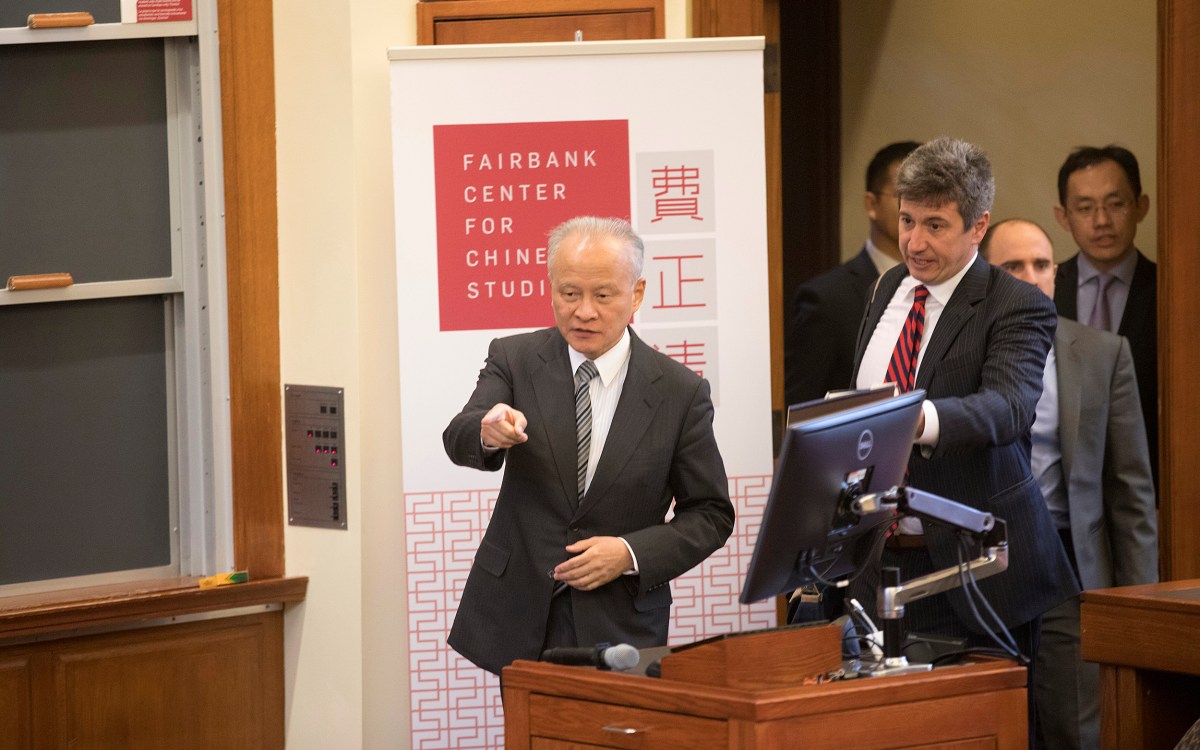
Workers sort freshly harvested bananas at a farm in Mexico.
AP Photo/Marco Ugarte
The sparring over trade
Kennedy School’s Robert Z. Lawrence analyzes the pivotal issues and possible outcomes
President Trump has backed down for now from a threat to impose new tariffs on goods imported from Mexico, citing promises by that country to crack down on northward migration. But the issue of tariffs, whether against Mexico or numerous other nations, remains a key economic focal point of this administration.
Far more than avocados and Modelo beer would see price hikes if the U.S. did eventually hike taxes on Mexico, one of its most important global trading partners. Everything from cars, phones, and laptops to fresh fruit and vegetables would cost consumers more, analysts say, and the increased costs and lowered demand could put people out of work.
Despite reaching agreement on a trade deal with Mexico and Canada in November, the still-unratified U.S.-Mexico-Canada Agreement, or “NAFTA 2.0” as some call it, President Trump recently pondered a 5 percent tariff that would have been added to goods and services coming in from Mexico barring an agreement to stem a rising flow of Central American migrants crossing into the U.S. The U.S. imported $371 billion from and exported $299 billion in goods and services to Mexico in 2018, according to the Office of the U.S. Trade Representative.
Mexico is just the latest nation subjected to trade pressures, including possible tariffs. In 2018, the administration imposed new tariffs, ranging from 10 to 25 percent, on $200 billion worth of Chinese goods. On June 1, China retaliated with similar tariff levels on $60 billion worth of U.S. goods. Now, the U.S. may levy tariffs on $300 billion more in Chinese imports. Trump also has threatened to levy a 25 percent tax on autos imported from the European Union, has considered taxing imports from Australia, and has complained for decades about a U.S. trade imbalance with Japan, though a new deal may be announced next month. Analysts warn that any sustained disputes could destabilize the global economy and prompt an economic downturn in the U.S., and may, with China, present serious national security risks as well.
The Gazette spoke last week with Robert Z. Lawrence, Albert L. Williams Professor of International Trade and Investment at Harvard Kennedy School’s Mossavar-Rahmani Center for Business and Government, about the myriad trade disputes and the potential consequences for companies, workers, and the economy.
Q&A
Robert Z. Lawrence
GAZETTE: How would you characterize the current state of U.S. trade relations? Is this an unnecessarily chaotic time of volatility, as some critics say, or a temporary period of disruption and change that could finally force obstinate trading partners like China to the table?
LAWRENCE: I think we’re at a potentially watershed point. For 70 years, the United States succeeded in gradually convincing our trading partners that they should adhere to a rules-based trading system, and what we’re now seeing, as a result of the trade policies of the Trump administration, is an undermining of that system, where its greatest protagonist, the United States, is now its greatest threat.
GAZETTE: In what way?
LAWRENCE: We led the world in a series of trade negotiations that established agreements, both multilaterally and with particular trading partners like Mexico and Canada, in which countries agreed to adhere to a certain set of rules. A key element in those rules was that the countries would not exceed certain levels of tariffs. And compliance with the rules was actually quite remarkable. But what’s been happening recently is the Trump administration has been undermining the system and breaking those rules. For example, the most basic principles of the World Trade Organization are that countries agree not to exceed certain limits for their tariff levels, and provide all members with equal treatment. When the United States unilaterally imposes tariffs on China at the levels that we have imposed, we violate both those principles.
GAZETTE: What are some of the most significant consequences that could result from these trade disputes?
LAWRENCE: What we saw over the past 30 years was a complete change in the way products are produced internationally. It used to be that a product would be made in one country and sold in another. Today, they’re produced [across] the world in global supply chains. Take your Apple iPhone: What you’ll discover is that it’s assembled in China, but it contains components from all over the world. But as a result of what’s been happening now, companies that operate global supply chains have been subject to a huge amount of disruption and uncertainty. They can’t be sure, if they plan to assemble in China or in Mexico, that those supply chains won’t be interrupted. It used to be that when you were planning these supply chains, you could at least be sure of the terms of your market access. No longer. So a second watershed is that the international investment responses of companies all around the world are going to be different.
GAZETTE: How are firms likely to respond?
LAWRENCE: It’s going to be a combination. In the short run, they don’t have a lot of flexibility, so what we’ve seen is that importers have been forced to pass on the Trump tariffs to American consumers. If the tariffs remain in place, however, they will try to produce in countries that aren’t subject to the tariffs. Quite a few firms thought they could move to Mexico as a safe haven in order to escape from the frictions of China. Now they’re learning Mexico isn’t immune either. … That will mean that the U.S. and other countries will lose the substantial gains to our living standards that have come from being able to produce goods and services in the most efficient locations.
GAZETTE: Could it trigger a U.S. or even a global recession?
LAWRENCE: Certainly, the effects are now building up to the magnitudes that are significant in terms of GDP [gross domestic product]. Now, the answer to that question will depend on whether the authorities, both in China and the United States and elsewhere, will be able to counteract the negative effects of these shocks with expansionary policies. For example, the Federal Reserve the other day announced that it would adopt a lower interest rate than it was planning. And in China the government is also planning new fiscal policies in order to try to offset some of the negative effects. It’s hard to predict, but certainly this is a shock for the global economy and will slow it down.
“So what do you get if you sign a trade agreement with the United States? That’s something all the other countries have to ask themselves. If the U.S. doesn’t adhere to the agreements, what’s the point?”
GAZETTE: Trump prefers bilateral trade agreements over multilateral deals, perhaps because he’s more familiar with them and feels they are easier to sell to voters. President Obama put a lot of emphasis on multilateral deals. Broadly, what are the benefits and drawbacks of each?
LAWRENCE: President Obama’s strategy with the Trans-Pacific Partnership was to sign an agreement with other Pacific countries that would not only bring us benefits but also increase our leverage to pressure China to change its behavior in order to get equal access to all their markets. But Trump thinks bilateral deals maximize U.S. leverage because we are bigger than each trading partner separately. But bilateral deals are less efficient and may have less scope for gains. The beauty of a multilateral deal is that if the conditions are the same with respect to all your trading partners, then you buy from the lowest-cost supplier. That’s an efficient way to do your trade. On the other hand, if you have different rules with respect to different trading partners, you could find yourself buying from less-efficient trading suppliers. I think bilaterals make the system more complex and divided and separated.
In addition, it’s generally easier to get congressional approval for multilateral deals. When there’s a bilateral negotiation, people tend to focus a lot on the characteristics of the other country because it has a face. But when you do a deal with the World Trade Organization, that’s a whole group of countries, and so people tend not to focus on the nontrade aspects of their relationships with those countries. If you look at the votes in Congress, it’s been easier to pass multilateral deals than bilateral deals because it becomes about business rather than the characteristics of a particular country.
GAZETTE: The rising populist movement in the U.S. and Europe has been driven, in part, by a view that the global economy has driven down wages or killed jobs for blue-collar and some white-collar workers.
LAWRENCE: I think the global trading system has enabled literally billions of people who live in poor countries to emerge from poverty. It has been a major driver of higher living standards, especially in poor countries, so I don’t think we should lose sight of that. Yes, in the U.S. and Europe there are workers who’ve been adversely affected by trade with low-wage countries. In addition, there are certain cities and parts of the United States, in the Rust Belt and elsewhere, that have had adverse effects. Nonetheless, most of the studies suggest the gains outweigh the losses. In addition, the overwhelming reason for the wages and employment difficulties experienced by blue-collar workers has been the result of technological changes like automation, which appear to be far more powerful and, I might say, inevitable, than international trade.
GAZETTE: Is it smart or realistic to adopt a kind of economic isolationism in 2019–2020?
LAWRENCE: Firstly, a transition to becoming more self-sufficient is going to be very disruptive. A lot of workers and firms that are engaged in producing as part of the supply chains are going to be hurt. And, in the long run, even if the production is brought back to the United States, the technologies that are going to be used to produce the products that were offshored are going to be far more sophisticated and require far more skills than the technologies that were used earlier. So even if it’s successful, this reindustrialization process is not going to help those workers who were dislocated and displaced.
GAZETTE: Given its track record, the U.S. may or may not follow through on tariff threats. Where do you think this goes from here?
LAWRENCE: I think a huge amount of damage has already been done. If we were to get an agreement with China, but we still have President Trump in the White House, you can’t really depend on the United States following through with that agreement. One of the great ironies, and you’ve just seen it in the last two weeks with Mexico, is that we’ve come to an agreement over the new NAFTA, where we’ve agreed to have no trade barriers between our two countries. Yet at the very same time, the president has felt uninhibited about using tariffs, which violate that agreement, in order to pursue his concerns about immigration. So what do you get if you sign a trade agreement with the United States? That’s something all the other countries have to ask themselves. If the U.S. doesn’t adhere to the agreements, what’s the point? The president has destroyed America’s reputation as a reliable partner, and countries can no longer trust we will do what we say.
GAZETTE: A new Goldman Sachs report says American voters disapprove of most of the trade actions against China, Mexico, Canada, and the E.U. Could these dust-ups simply end if Trump decides they hurt, not help, his reelection?
LAWRENCE: That may be a possibility. But I will say, one of the few areas where Donald Trump has a deep conviction, and you can see it in his statements going back to the 1980s, is the idea that tariffs are good for the United States. One reason that he has been systematically underestimated by the Chinese and by the markets is that they believe that the only thing he’s going to be interested in is his popularity. But I think this is an area where he has deep convictions, and he has shown a willingness to impose tariffs whenever he can find a pretext. I believe his views are misguided, but I wouldn’t count on him changing his mind. You keep hearing him praising the benefits of tariffs. I think what will be very important is going to be how the Republicans respond to his tariff threats to Mexico, because if they vote to deny him the ability to impose them, what he would fear more than the polls is losing his clout within the Republican Party and his ability to impose tariffs at will. They ought to, but it remains to be seen if they will.
This interview has been edited for length and clarity.






